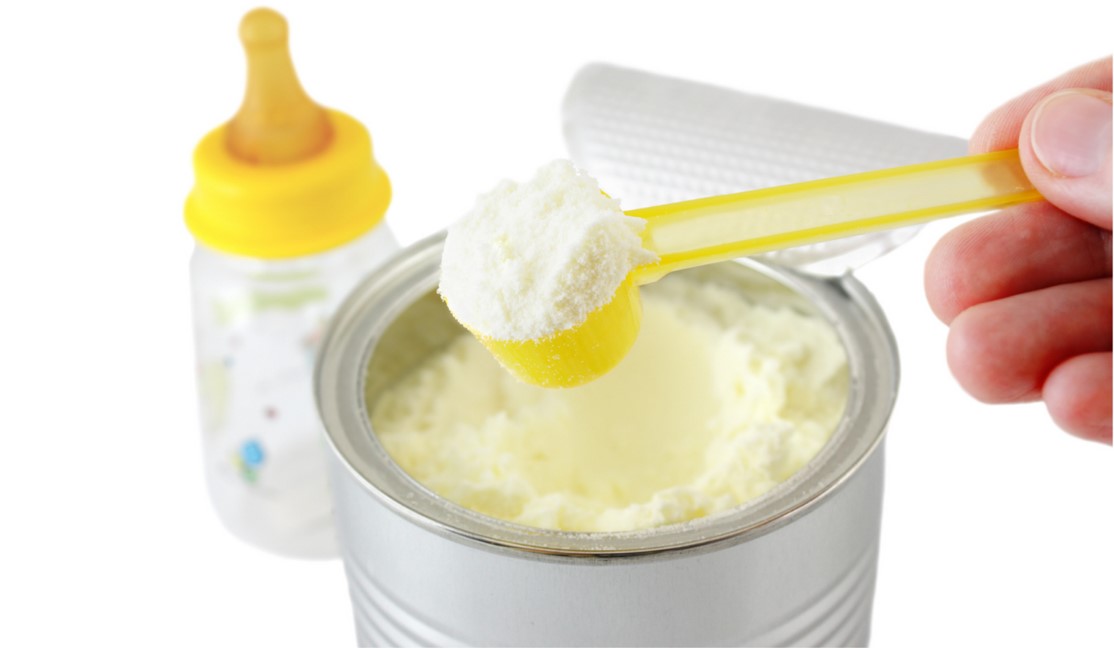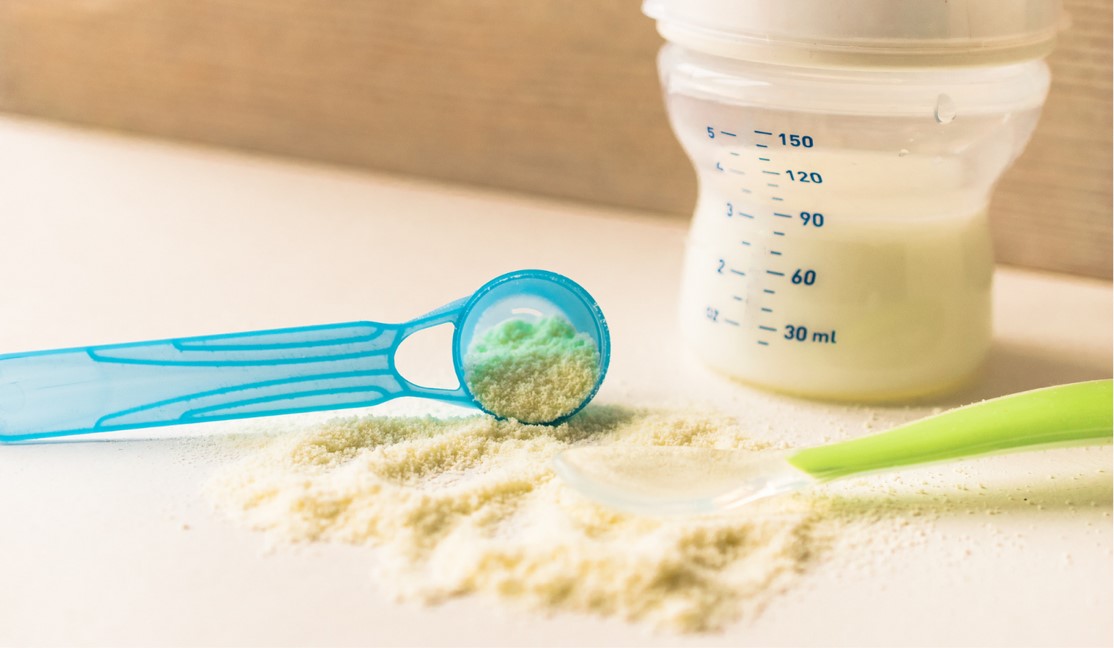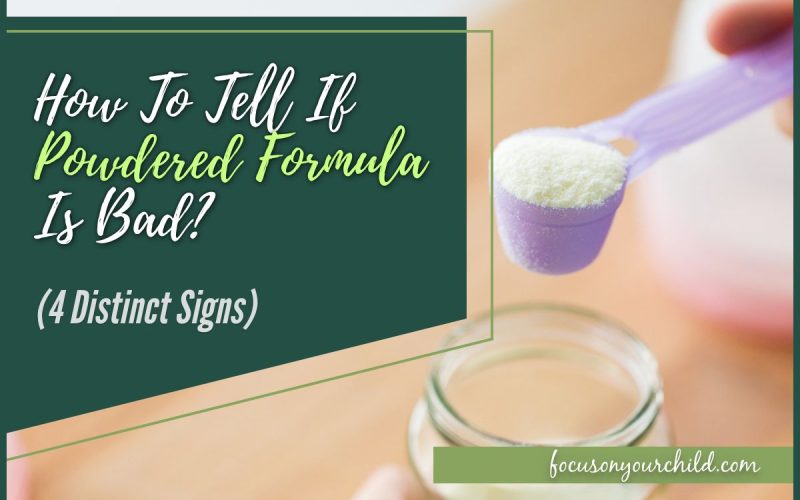Next to breastfeeding, powdered formula has become one of the most nutritionally sound ways to feed your baby. It is convenient, safe, nutritionally balanced, and typically cheaper than liquid and ready-to-feed formulations.
Baby formulas are created to closely mimic the nutritional content breastmilk offers. Manufacturers add vitamins, minerals, amino acids, and such other nutrients such as fat and sugar. These ingredients have varying shelf lives which can affect the freshness of powdered formula.
Powdered baby formula cans are stamped with use-by dates which indicate the shelf life of a sealed, unopen can. Once opened, most cans of formula lasts a month. Prepared, a bottle of formula stays good for 2 hours at room temperature and up to 24 hours in the refrigerator, provided it remains untouched and undrunk.
Even with an expiration date, powdered formula can still go bad before then for various reasons. It is important to check your baby’s formula for freshness every time it is prepared, and to discard it if you suspect that it is no longer safe for your baby’s consumption.
Signs That Unprepared Powdered Formula Has Gone Bad

After being opened, powdered formula needs to be stored in an airtight container in a cool, dry place away from direct sunlight. Freezing and refrigeration of the powder is not recommended, as it can introduce moisture and cause changes to the formula’s composition.
Even with proper storage and handling however, powdered formula can still be prone to spoiling. It may not always be perfectly obvious whether or not a can of formula should kept or tossed, although there are certain signs that you can watch out for.
Remember that it is always best to play it safe when it comes to your baby’s well-being. If you have any doubts as to the safety of your powdered formula, throw it out and replace it with a container of formula you are sure is safe.
1. It’s Past the Expiration Date
Baby formula manufacturers usually stamp the products expiration date or use-by date on the lid or bottom of the can. Any formula that has gone past its expiry should be discarded, even if it looks and smells fine. The vitamins and nutrients in the formula degrade and become less effective overtime, even if the formula may not necessarily be harmful to your baby.
2. It Was Opened More Than 30 Days Ago
Most formula brands have an opened shelf life of 30 days within the formula must be consumed. A tip some people use is to mark the opening date on the bottom of the can or on the lid as a reminder of the formula’s shelf life.
Different brands and formulations may have varying shelf lives. Organic formula brands may have shorter shelf lives than other more mainstream brands.
3. The Powder is Discolored
Infant formula usually has a milky, slightly off white color. Colors other than that may be due to contamination from moisture and mold, or separation of the formula’s ingredients.
4. The Formula Smells Off
This may be harder to establish, as some people find fresh baby formula to have a strong off putting smell caused by certain ingredients which help make the formula nutritionally sound. Fishy smells may be caused by added DHA which is sourced from fatty fish. Metallic smells may be caused by added minerals such as iron. Lactose free formulas may give off a cheesy smell.
In general, despite the different smells powdered formula can hold, it should not smell sour or rancid. If you find that your can of formula smells sour or just different from what you are used to, it’s best just to stop using it.
How Long Does Prepared Formula Last?

For the most part, the same rules apply to prepared formula as with unprepared powder. Any discoloration, smell, or separation of its liquid components are signs that the formula needs to be discarded.
Once powdered formula has been mixed with water, its shelf life changes considerably. Provided it has not been drunk from, prepared formula can be kept refrigerated for up to 24 hours at temperatures of 40° F (4.4°C) or lower. Some parents choose to prepare the whole day’s supply of formula at once and keep it in the fridge this way.
If left at room temperature, prepared formula lasts 2 hours, after which it needs to be discarded. After being warmed, formula can only be kept for an hour as the warm temperature combined with the high nutrient content make favorable breeding grounds for bacteria.
How To Keep Powdered Formula From Going Bad
Proper storage is key to preserving the freshness of powdered formula. As long as it is kept in a cool, dry place, a sealed can of powdered formula should not go bad before the expiry date.
Once opened, formula should be kept in an airtight container in a cool, dry place. Making sure to use clean and dry measuring utensils will also prevent contamination of the powder.
Exposure to extreme temperatures caused by being left in a hot car or being placed in the refrigerator or freezer should be avoided, as changes and degradation of the formula’s composition can occur.
With prepared formula, prepare only what you will be using in the given times – 24 hours in refrigeration, 2 hours at room temp, and 1 hour after being warmed. Formula which has been warmed can no longer be re-refrigerated.
If you plan to go out with your baby for more than a few hours, bringing pre-measured unprepared powder and water separately in a thermos will prevent the formula from going bad before you can use it. Using ready-to-feed formula may also be a more convenient and reliable way of feeding your baby while out and about.




